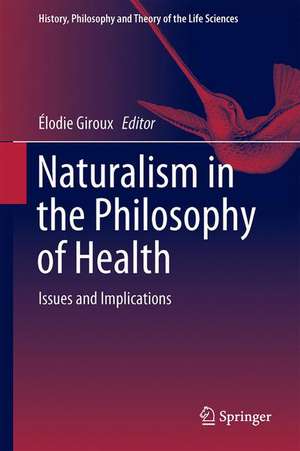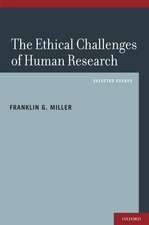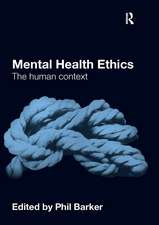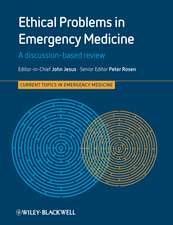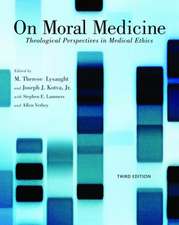Naturalism in the Philosophy of Health: Issues and Implications: History, Philosophy and Theory of the Life Sciences, cartea 17
Editat de Élodie Girouxen Limba Engleză Hardback – 10 mai 2016
This volume offers the first comprehensive review and critical assessment of the nature and status of naturalism in the philosophy of health. It explores the notion of biological normativity and its relevance for the philosophy of health, and it analyses the implications of the philosophical theories of health for healthcare and the debate on health enhancement.
In the first section, several contributions identify the kind of ‘naturalism’ the biostatistical theory belongs to and offer further criticisms or possible modifications, such as the concept of function that is required by this theory, and whether a comparativist approach to health is more relevant than a non-comparativist one. The second section explores natural or biological ‘normativity’ and some possible accounts of health that could be based on this concept. The third and final section focuses on the implications of naturalism in healthcare. 'Goals of Medicine’ is the first paper in which Christopher Boorse ventured toward analysing the implication of his biostatistical theory of health on the practice of medicine, the difficult issue of the goals of medicine and the boundary between treating and enhancing. Other papers in this section critically evaluate Boorse’s account and analyse the importance of a positive concept of health.
| Toate formatele și edițiile | Preț | Express |
|---|---|---|
| Paperback (1) | 555.52 lei 38-44 zile | |
| Springer International Publishing – 27 mai 2018 | 555.52 lei 38-44 zile | |
| Hardback (1) | 642.83 lei 22-36 zile | |
| Springer International Publishing – 10 mai 2016 | 642.83 lei 22-36 zile |
Din seria History, Philosophy and Theory of the Life Sciences
- 18%
 Preț: 735.84 lei
Preț: 735.84 lei - 15%
 Preț: 644.95 lei
Preț: 644.95 lei -
 Preț: 349.62 lei
Preț: 349.62 lei - 18%
 Preț: 1246.15 lei
Preț: 1246.15 lei - 18%
 Preț: 785.55 lei
Preț: 785.55 lei -
 Preț: 398.63 lei
Preț: 398.63 lei - 15%
 Preț: 701.06 lei
Preț: 701.06 lei -
 Preț: 389.11 lei
Preț: 389.11 lei - 15%
 Preț: 651.02 lei
Preț: 651.02 lei -
 Preț: 391.22 lei
Preț: 391.22 lei - 15%
 Preț: 646.43 lei
Preț: 646.43 lei - 24%
 Preț: 590.17 lei
Preț: 590.17 lei - 15%
 Preț: 644.49 lei
Preț: 644.49 lei - 18%
 Preț: 1120.05 lei
Preț: 1120.05 lei - 15%
 Preț: 583.78 lei
Preț: 583.78 lei - 5%
 Preț: 1103.39 lei
Preț: 1103.39 lei -
 Preț: 438.69 lei
Preț: 438.69 lei - 15%
 Preț: 693.57 lei
Preț: 693.57 lei - 15%
 Preț: 638.57 lei
Preț: 638.57 lei - 5%
 Preț: 906.63 lei
Preț: 906.63 lei - 15%
 Preț: 692.09 lei
Preț: 692.09 lei -
 Preț: 353.99 lei
Preț: 353.99 lei - 18%
 Preț: 949.23 lei
Preț: 949.23 lei - 18%
 Preț: 735.21 lei
Preț: 735.21 lei - 18%
 Preț: 725.75 lei
Preț: 725.75 lei - 18%
 Preț: 792.19 lei
Preț: 792.19 lei -
 Preț: 357.63 lei
Preț: 357.63 lei - 24%
 Preț: 713.95 lei
Preț: 713.95 lei -
 Preț: 354.38 lei
Preț: 354.38 lei - 18%
 Preț: 735.38 lei
Preț: 735.38 lei
Preț: 642.83 lei
Preț vechi: 756.27 lei
-15% Nou
Puncte Express: 964
Preț estimativ în valută:
123.01€ • 128.75$ • 102.38£
123.01€ • 128.75$ • 102.38£
Carte disponibilă
Livrare economică 10-24 martie
Preluare comenzi: 021 569.72.76
Specificații
ISBN-13: 9783319290898
ISBN-10: 3319290894
Pagini: 237
Ilustrații: VI, 229 p. 3 illus.
Dimensiuni: 155 x 235 x 18 mm
Greutate: 0.49 kg
Ediția:1st ed. 2016
Editura: Springer International Publishing
Colecția Springer
Seria History, Philosophy and Theory of the Life Sciences
Locul publicării:Cham, Switzerland
ISBN-10: 3319290894
Pagini: 237
Ilustrații: VI, 229 p. 3 illus.
Dimensiuni: 155 x 235 x 18 mm
Greutate: 0.49 kg
Ediția:1st ed. 2016
Editura: Springer International Publishing
Colecția Springer
Seria History, Philosophy and Theory of the Life Sciences
Locul publicării:Cham, Switzerland
Public țintă
ResearchCuprins
Chapter 1: Introduction. Why a Book on Naturalism in the Philosophy of Health?; Élodie Giroux.- PART I: The Biostatistical Theory of Disease: Criticisms and Improvements.- Chapter 2: Is Boorse’s Biostatistical Theory of Health Naturalistic?; Maël Lemoine.- Chapter 3: In Search of Normal Functions: BST, Cummins Functions, and Hempel’s Problem; Marion Le Bidan.- Chapter 4: On Comparative Versus Non-comparative Theory of Health; Daniel Hausman.- Chapter 5: What a Naturalist Theory of Illness Should be; Thomas Schramme.- PART II: Health, Normativity and Naturalism.- Chapter 6: Contextualizing Medical Norms: Georges Canguilhem’s Surnaturalism; Jonathan Sholl.- Chapter 7: Organizational Malfunctions and the Notions of Health and Disease; Cristian Saborido.- Chapter 8: Biological Organization and Pathology: Three Views on the Normativity of Medicine; Arantza Etxeberria.- PART III: Implications for Healthcare.- Chapter 9: Goals of Medicine; Christopher Boorse.- Chapter 10: From ‘Better Than Well’ to ‘More Than Human’; Jean-Yves Goffi.- Chapter 11: Broadening and Balancing the Goals of Medicine: Battling Disease and Treating the Healthy; Peter Schwartz.- Chapter 12: A Defence of a Holistic Notion of Health; Lennart Nordenfelt.
Recenzii
“Naturalism in the Philosophy of Health is a comprehensive last word on the current debate between naturalistic and normative conceptions of health and disease. … it will serve well as an senior level undergraduate introduction to the Philosophy of Health or as a text in a special graduate studies course in this field. … It is well worth the read!” (Wendy C. Hamblet, metapsychology online reviews, metapsychology.mentalhelp.net, Vol. 20 (40), October, 2015)
Notă biografică
Élodie Giroux is a philosopher of medicine who works mainly on issues about health concepts and epidemiology. Her main interests are history of risk factor epidemiology, philosophy of epidemiology, causation in medicine and public health, health and disease concepts. Besides several papers on history of modern epidemiology, she published Après Canguilhem, définir la santé et la maladie (2010), she edited a special issue on the history of risk factor epidemiology (in Revue d’Histoire des Sciences, 2011) and co-edited Philosophie de la médecine II (with Maël Lemoine, 2012) and Comprendre la vieillesse (with Sarah Carvallo, 2012).
Textul de pe ultima copertă
In a series of papers published in the 1970s, Christopher Boorse proposed a naturalist theory of health, mainly based on a value-free concept of ‘biological function’, a concept of ‘reference class’ and the notion of ‘statistical normality’. His theory has profoundly shaped the philosophical debates on the concepts of health and disease. It could even be said that the numerous criticisms of his 'biostatistical theory' are at the centre of what is usually referred to as the debate between ‘normativists’ and ‘naturalists’. Today, the predominant naturalist theory of health is still Boorse’s biostatistical theory.
This volume offers the first comprehensive review and critical assessment of the nature and status of naturalism in the philosophy of health. It explores the notion of biological normativity and its relevance for the philosophy of health, and it analyses the implications of the philosophical theories of health for healthcare and the debate on health enhancement. In the first section, several contributions identify the kind of ‘naturalism’ the biostatistical theory belongs to and offer further criticisms or possible modifications, such as the concept of function that is required by this theory, and whether a comparativist approach to health is more relevant than a non-comparativist one. The second section explores natural or biological ‘normativity’ and some possible accounts of health that could be based on this concept. The third and final section focuses on the implications of naturalism in healthcare. 'Goals of Medicine’ is the first paper in which Christopher Boorse ventured toward analysing the implication of his biostatistical theory of health on the practice of medicine, the difficult issue of the goals of medicine and the boundary between treating and enhancing. Other papers in this section critically evaluate Boorse’s account and analyse the importance of a positive concept of health.
This volume offers the first comprehensive review and critical assessment of the nature and status of naturalism in the philosophy of health. It explores the notion of biological normativity and its relevance for the philosophy of health, and it analyses the implications of the philosophical theories of health for healthcare and the debate on health enhancement. In the first section, several contributions identify the kind of ‘naturalism’ the biostatistical theory belongs to and offer further criticisms or possible modifications, such as the concept of function that is required by this theory, and whether a comparativist approach to health is more relevant than a non-comparativist one. The second section explores natural or biological ‘normativity’ and some possible accounts of health that could be based on this concept. The third and final section focuses on the implications of naturalism in healthcare. 'Goals of Medicine’ is the first paper in which Christopher Boorse ventured toward analysing the implication of his biostatistical theory of health on the practice of medicine, the difficult issue of the goals of medicine and the boundary between treating and enhancing. Other papers in this section critically evaluate Boorse’s account and analyse the importance of a positive concept of health.
Caracteristici
Offers the first comprehensive review and critical assessment of the nature and status of naturalism in philosophy of health Presents an analysis of the implications of the philosophical theories of health for healthcare and for the debate on health enhancement Explores the notion of biological normativity and of its relevance for the philosophy of health
